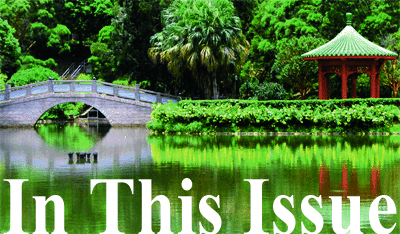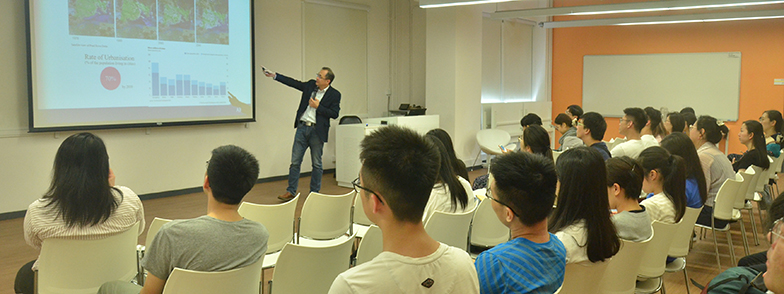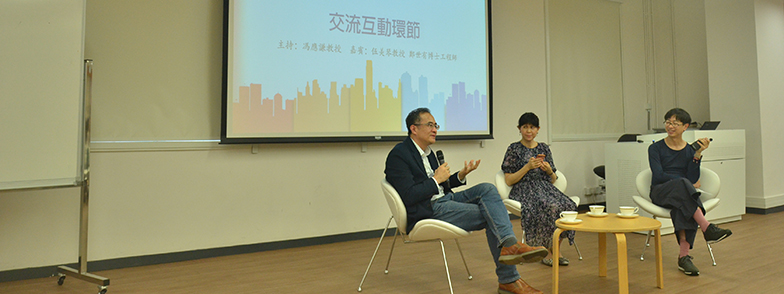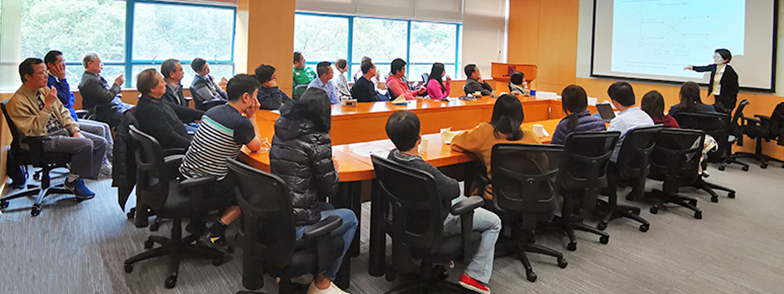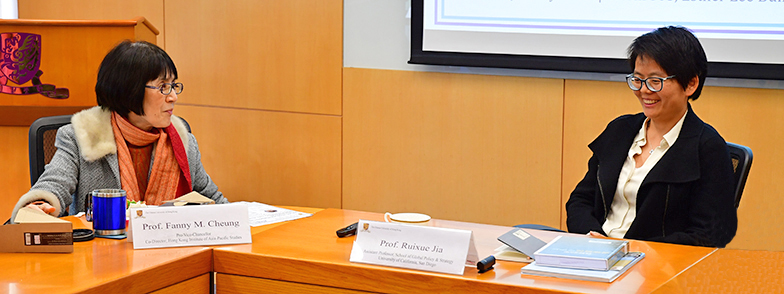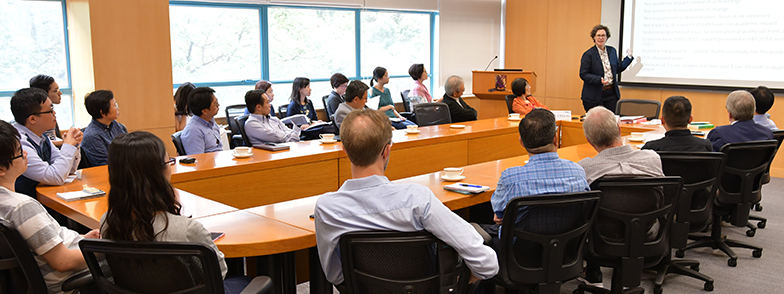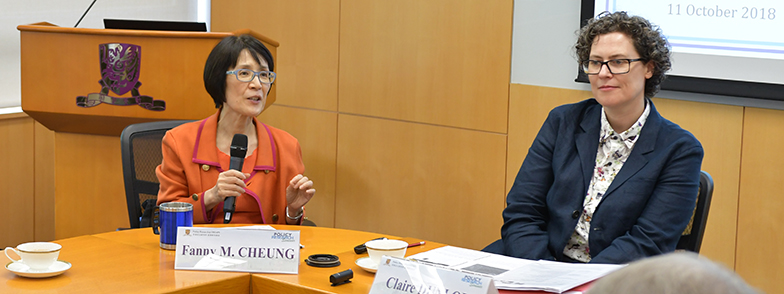
|
|||||||||||||||||||||||||||||||||||||||||||||||||||||||||||||||||||||||||||||||||||||
| Policy Research Seminars |
|
|
|
Youth Global Citizenship Seminar: Future City — Youth’s Potential in Developing a Sustainable City
1 June 2019 | 14:30–16:30 | Room 502, Wong Foo Yuan Building, CUHK |
|
|
Speakers
Prof. Mee-kam Ng Dr Vincent S. Y. Cheng Prof. Anthony Y. H. Fung |
Associate Director, Institute of Future Cities, CUHK Director of Building Sustainability, Arup Co-Director, HKIAPS |
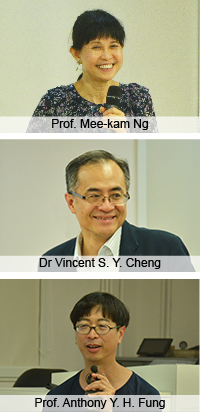 Organizers
OrganizersCentre for Youth Studies, HKIAPS Policy Research @ HKIAPS Oxfam Hong Kong In 2015, the United Nations proposed the “Sustainable Development Goals” (SDGs), providing a blueprint for the world to achieve a better and more sustainable future. Among the 17 SDGs, 10 of them are closely related to urban development and environmental protection. Youth, as the future leaders and decision makers of society, are going to be the core facilitators of the sustainable cities of the future. In the seminar, Prof. Mee-kam Ng, Dr Vincent S. Y. Cheng, and Prof. Anthony Y. H. Fung were invited to share their views on the role and potential of young people in developing sustainable cities. The seminar covered four main topics: (1) The definition and concept of a sustainable city, (2) Hong Kong’s urban development and related policies, (3) A comparison between Hong Kong and countries along the Belt and Road Initiative, and (4) Youth’s role and potential in developing a sustainable city. Around 40 participants attended the seminar. ■ |
|
|
When History Matters Little: Political Hierarchy and Regional Development in China, AD1000–2000
21 January 2019 | 12:30–14:00 | Room 505, Esther Lee Building, CUHK |
|
|
Speaker
Prof. Ruixue Jia |
Assistant Professor, School of Global Policy & Strategy, University of California, San Diego |
|
Moderator
Prof. Fanny M. Cheung |
Pro-Vice-Chancellor, CUHK; Co-Director, HKIAPS |
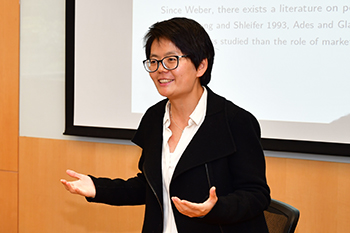 Because regime changes in China between AD 1000 and 2000 systematically altered the relative importance of different regions in the political hierarchy, tracing the evolution of Chinese provincial capitals and economic activities during this period sheds light on how political factors can shape the economic geography of a place. In the seminar, Prof. Jia employed a panel dataset of 261 prefectures to show that while a prefecture definitely benefits from gaining provincial capital status in terms of population density and urbanization, the economic advantage of a provincial capital prefecture shrinks greatly after capital status is lost—implying that history does not always matter.
Because regime changes in China between AD 1000 and 2000 systematically altered the relative importance of different regions in the political hierarchy, tracing the evolution of Chinese provincial capitals and economic activities during this period sheds light on how political factors can shape the economic geography of a place. In the seminar, Prof. Jia employed a panel dataset of 261 prefectures to show that while a prefecture definitely benefits from gaining provincial capital status in terms of population density and urbanization, the economic advantage of a provincial capital prefecture shrinks greatly after capital status is lost—implying that history does not always matter.
Prof. Jia further explained that it is not only public offices but also important factors of production, such as human capital and transportation networks, that alter their geographical location with a change in provincial capital status. Hence, provincial capitals cannot simply be regarded as consumption-intensive “parasite cities”, and the state can play a critical role in overcoming economic inertia in a particular location by providing infrastructure. At the end of the seminar, Prof. Jia concluded that the study provided an opportunity to uncover how politics has shaped economic geography. She said that it has proven that a glorious past matters little to a region once it has moved down the political hierarchy. She pointed out that by documenting when history matters little, why history matters can be better understood: history would matter more if the state lacked the incentive to relocate a capital. Around 30 faculty members and researchers attended the seminar. ■ |
|
|
Translation of Research into Public Policy: Lessons from Politics/International Studies Cases
11 October 2018 | 14:00–15:00 | Room 505, Esther Lee Building, CUHK |
|
|
Speaker
Prof. Claire Dunlop |
Professor of Politics and Public Policy, Department of Politics, University of Exeter |
|
Moderator
Prof. Fanny M. Cheung |
Pro-Vice-Chancellor, CUHK; Co-Director, HKIAPS |
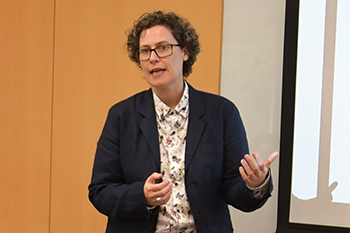 In the seminar, Prof. Dunlop presented the first systematic analysis of the case studies in Politics and International Studies that were submitted for a research audit in the UK in 2014 (Research Excellence Framework, REF 2014). She first introduced the background, context, rules, and definition of the impact of REF 2014, and explained the scoring system of the framework. Then, using frequency data and case study examples, she outlined the political economy of the impact of political science and international studies across four broad themes: who has what impact and when; the beneficiaries of the impact; the evidence base of the impact; and generating and validating the impact.
In the seminar, Prof. Dunlop presented the first systematic analysis of the case studies in Politics and International Studies that were submitted for a research audit in the UK in 2014 (Research Excellence Framework, REF 2014). She first introduced the background, context, rules, and definition of the impact of REF 2014, and explained the scoring system of the framework. Then, using frequency data and case study examples, she outlined the political economy of the impact of political science and international studies across four broad themes: who has what impact and when; the beneficiaries of the impact; the evidence base of the impact; and generating and validating the impact.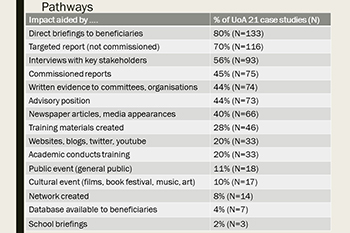 According to Prof. Dunlop’s research, a wide range of actors and sectors are willing to form effective relationships with academics. UK government executives are the major beneficiaries of work conducted in politics and international studies. They are the beneficiaries in two-thirds of cases, while UK parliaments and assemblies feature in more than 40%. Moving beyond how relationships of impact start, she pointed out that there are multiple communication pathways to impact. In most of the cases, direct interaction is the primary pathway: 80% of cases are cited in direct briefings, while 56% are cited in interviews with key stakeholders. Events where academics rub shoulders with citizens are mentioned in only 11% of the cases.
According to Prof. Dunlop’s research, a wide range of actors and sectors are willing to form effective relationships with academics. UK government executives are the major beneficiaries of work conducted in politics and international studies. They are the beneficiaries in two-thirds of cases, while UK parliaments and assemblies feature in more than 40%. Moving beyond how relationships of impact start, she pointed out that there are multiple communication pathways to impact. In most of the cases, direct interaction is the primary pathway: 80% of cases are cited in direct briefings, while 56% are cited in interviews with key stakeholders. Events where academics rub shoulders with citizens are mentioned in only 11% of the cases.At the end of the seminar, Prof. Dunlop concluded with a discussion on the ramifications for the discipline of her case analysis. More than 30 faculty members and researchers attended the seminar. ■ |
|
